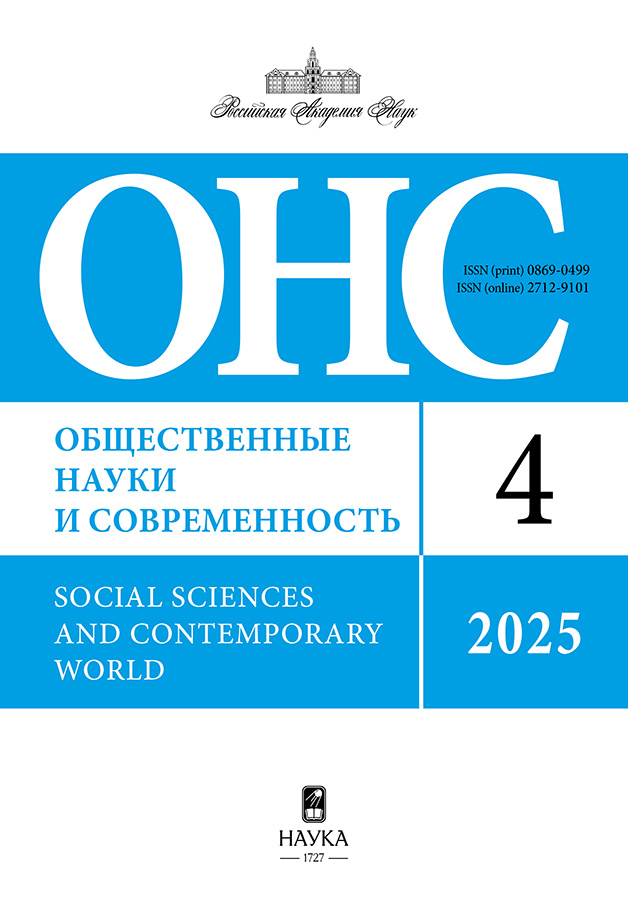Позиция Европейского союза по климатической миграции
- Авторы: Потемкина О.Ю.1
-
Учреждения:
- Институт Европы Российской академии наук
- Выпуск: № 4 (2025)
- Страницы: 22-33
- Раздел: НА ПРОСТРАНСТВАХ ЕВРАЗИИ
- URL: https://consilium.orscience.ru/0869-0499/article/view/692740
- DOI: https://doi.org/10.31857/S0869049925040021
- ID: 692740
Цитировать
Полный текст
Аннотация
Исследование посвящено проблеме климатической миграции и подходам Европейского союза к ее решению. На основе анализа правовых и политических документов Евросоюза автор показывает, что ЕС признает взаимосвязь между миграцией и изменениями климата, но не предлагает конкретных мер по защите прав климатических мигрантов и беженцев. Проведен анализ возможности модернизации законодательства в новом Пакте о миграции и убежище для признания прав климатических беженцев. Автор заключает, что в условиях роста антимигрантских настроений, популярности крайне правых партий ЕС предпочитает скорее переложить ответственность за регулирование миграционного потока на страны происхождения мигрантов, чем расширить основания для получения статуса климатического беженца.
Об авторах
О. Ю. Потемкина
Институт Европы Российской академии наук
Автор, ответственный за переписку.
Email: olga_potemkina@mail.ru
Москва, Россия
Список литературы
- Войников В.В. (2024) Реформа общеевропейской системы предоставления убежищ в контексте реализации принципа солидарности ЕС // Полис. Политические исследования. № 1. С. 149–162. https://doi.org/10.17976/jpps/2024.01.11
- Vojnikov V. (2024) The Reform of the Common European Asylum System in the Context of the Implementation the EU Principle of Solidarity. Polis. Political studies. no 1, pp. 149–162. https://doi.org/10.17976/jpps/2024.01.11 (In Russ.)
- Леденева В. Ю. (2021) Климатическая миграция: тенденции и прогнозы // Известия Юго-Западного государственного университета. Серия: Экономика. Социология. Менеджмент. № 6. С. 233–242. https://doi.org/10.21869/2223-1552-2021-11-6-233-242
- Ledeneva V. (2021) Climate Migration: Trends and Forecasts. Proceedings of the Southwest State University. Series: Economy. Sociology. Management. no. 6, pp. 233–242. https://doi.org/10.21869/2223-1552-2021-11-6-233-242 (In Russ.)
- Лукьянец А. С. (2020) Климатическая миграция в условиях пандемии Covid-19 // Научное обозрение. Серия 1: Экономика и Право. № 3. С. 22–33. https://doi.org/10.26653/2076-4650-2020-3-02
- Lukyanets A. (2020) Climate Migration in a Pandemic COVID-19. Scientific review. Series 1. Economics and Law. nо. 3, pp. 22–33. https://doi.org/10.26653/2076-4650-2020-3-02 (In Russ.)
- Alverio G.N., Sowers J., Weinthal E. (2024) Climate change, conflict, and urban migration. Environment and Security. vol. 2. Issue 1. Pp. 1–12.
- Gemenne F. (2011) How They Became the Human Face of Climate Change. Research and Policy Interactions in the Birth of the ‘Environmental Migration’ Concept. In: Migration and Climate Change. Eds.: Piguet E., Pécoud A., De Guchteneire P. Cambridge: Cambridge University press. Pp. 225–260.
- Gonzalez C.G. (2019) Climate Justice and Climate Displacement: Evaluating the Emerging Legal and Policy Responses. Wisconsin International Law Journal. Vol. 36, no. 2, pp. 36–6396.
- Haas H. (2023) How Migration Really Works. The Facts about the Most Divisive Issue in Politics. NY: Basic books. 464 p.
- Keckhut N. (2024) Climate Change and Migration. The Development of a European Legal Approach between International Protection and Human Rights. Political science. 230 p. (https://dumas.ccsd.cnrs.fr/dumas-04711173v1/file/Keckhut%20Thesis%20-%20Complete%20%28V1.2%29.pdf).
- Kulin J., Johansson Sevä I., Dunlap R. E. (2021) Nationalist Ideology, Rightwing Populism and Public Views about Climate Change in Europe. Environmental Politics. Vol. 30. Issue 7. Pp. 1111–1134.
- Mayrhofer M., Ammer M. (2022) Climate Mobility to Europe. The Case of Disaster Displacement in Austrian Asylum Procedures. Frontiers in Climate. Issue 4. Pp. 1–19.
- Moawad D. (2024) Does Environmental Change Affect Migration Especially into the EU? Social Sciences. Vol. 13. no. 1. Pp. 1–24.
- Mugambiwa S., Sibanda P. (2025) Climate Change, Migration, and Displacement: Advancing a Risk-informed Approach for Sustainable Solutions. International Journal of Population Studies. 5165. (https://accscience.com/journal/IJPS/articles/online_first/4707).
- Schraven B. (2023) Inclusion of Migration and Migrants in Climate-resilient Development Pathways in the Context of the European Green Deal. Geneva: International Organization for Migration (IOM) pub. 41 p.
- Scissa C. (2022) The Climate Changes. Should EU Migration Law Change as Well? Insights from Italy. European Journal of Legal Studies. Issue 14(1). Pp. 5–23.
- Scissa C., Martin S.F. (2024) Migration in the Context of Climate and Environmental Changes within Central Asia and to the European Union and the Russian Federation. Geneva: International Organization for Migration (IOM) pub. 104 p.
- Scissa C. (2023) The Principle of Non-refoulement and Environmental Migration. Diritto, Immigrazione e Cittadinanza. Fascicolo. no 3. Pp. 179–212.
- Scodanibbio A. (2024) Climate Justice and Human Mobility. Egmont Policy Brief 347 (https://www.egmontinstitute.be/app/uploads/2024/06/Alicia-Scodanibbio_Policy_Brief_347.pdf?type=pdf).
- Sumudu A.A. (2018) A New Category of Refugees: Beyond the Legal Impasse? In: Climate Refugees: Beyond the Legal Impasse? Eds.: Behrman S., Kent A. London: Routledge. Pp. 34–41.
Дополнительные файлы











